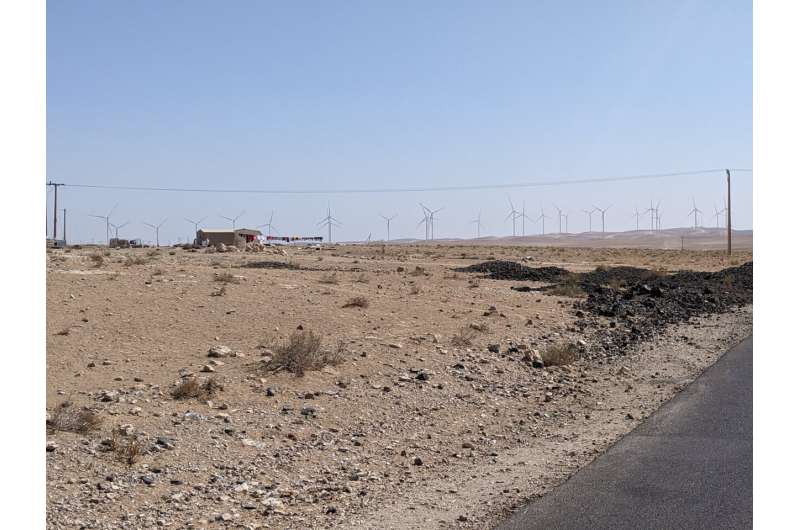This article has been reviewed according to Science X's editorial process and policies. Editors have highlighted the following attributes while ensuring the content's credibility:
fact-checked
proofread
Jordanians keen to harness community benefits of energy transition

Jordan has outstanding potential for renewable energy generation. Government backing for the country's energy transition was strong through to 2019, but has dropped off since then.
A household survey conducted by the Research Institute for Sustainability—Helmholtz Center Potsdam (RIFS) shows that citizens want to see this change: 91% of respondents expressed their support for an expansion of renewable energies in Jordan.
They hope that this will create jobs, improve energy security and reduce costs. Support is particularly strong in areas that already benefit from renewables. The results are published in Climate Policy.
Different places, different conditions
Jordan is one of the most energy-import-dependent countries in the world: More than 93% of total energy is imported in the form of oil and gas. However, long-term purchasing agreements for oil and gas signed by the state energy company have prevented the further expansion of renewables.
Some studies also cite near-term energy security concerns and the interests of geopolitical actors, in particular the U.S., as important factors behind the stalling of the energy transition. Jordan's energy dependency is widely viewed as a serious political and economic problem and is contributing to the country's growing debt burden.
"Jordan is an interesting case to study public perceptions and attitudes around the energy transition, as it has excellent potential for renewable energy generation but an illiberal political system. Its energy transition was decreed from the top down and is now faltering.
"Little research has been conducted on non-democratic contexts of this kind to date. Our study is a contribution to understanding the prerequisites for a successful energy transition in the Global South," explains lead author Silvia Weko (now at Friedrich Alexander University of Erlangen-Nuremberg).
Together with co-author Esther Schuch (RIFS), Weko investigated attitudes towards the Jordanian energy transition by surveying 320 households in four different locations and interviewing experts.
The selected locations—East Amman, West Amman, Zarqa and Tafilah—have very different social and economic conditions: West Amman is the center of government power and home to higher-income population groups. Palestinian and Syrian refugee settlements are located in the lower-income eastern districts of Amman.
The city of Zarqa (700,000 inhabitants) is one of Jordan's most important industrial centers and is located north of Amman. Fossil energy is an important part of the city's economy, and an oil refinery is among the major employers. The city of Tafilah (30,000 inhabitants) is located in the south of Jordan, with large wind power projects nearby.
New jobs, cheaper electricity
Attitudes towards the energy transition were generally positive. Only 29 respondents (9%) disagreed or strongly disagreed with the statement that "Jordan should use solar and wind energy instead of fossil fuels." Knowledge about climate change was mixed, but only 3% of respondents doubted its existence. Around 40% of respondents stated that they or someone they know had already been personally impacted by climate change.
A full 83% expressed the expectation that the energy transition would create new jobs in Jordan. "In fact, this hope is based on experience, as more than 300 solar PV companies have created thousands of jobs in Jordan. This is important given that Jordan has high unemployment, particularly among young people," explains Weko. Most respondents were also very concerned about high energy costs and energy security.
Renewables impress with water savings
The survey revealed major differences between the communities. People in Tafilah, the town near to the large wind farm, were on average more supportive of the energy transition and more concerned about climate change than respondents in Zarqa, which is dominated by the oil industry, and the economically weaker East Amman. By contrast, respondents in West Amman, a comparatively affluent and educated residential area, expressed strong support for renewable energy.
"Our household survey showed that—contrary to the opinion of Jordanian elites—citizens do have an opinion on renewable energies. One interesting finding is that respondents prioritized the benefits of the energy transition for the community over individual benefits. They hope that the energy transition will generate employment opportunities and deliver financial benefits for communities.
"Local environmental benefits also play a role, such as the water savings that renewables can achieve compared to thermal power plants," explains co-author Esther Schuch. Water scarcity is a major problem in Jordan.
Policy must take regional differences into account
According to the researchers, the survey's findings imply that the Jordanian government should reverse its policy of blocking the expansion of renewables. Instead, they should make it clear that renewable energies can be harnessed to address local and national challenges such as high energy prices.
It is important that policymakers take regional differences into account and develop strategies to mitigate negative impacts such as job losses in areas that are home to fossil-intensive industries and unlikely to benefit directly from the development of wind and solar parks, which will likely be established in Jordan's desert regions.
More information: Silvia Weko et al, What determines local attitudes towards Jordan's renewable energy transition? Evidence from household surveys, Climate Policy (2024). DOI: 10.1080/14693062.2024.2353146
Provided by Forschungsinstitut für Nachhaltigkeit Helmholtz-Zentrum Potsdam





















